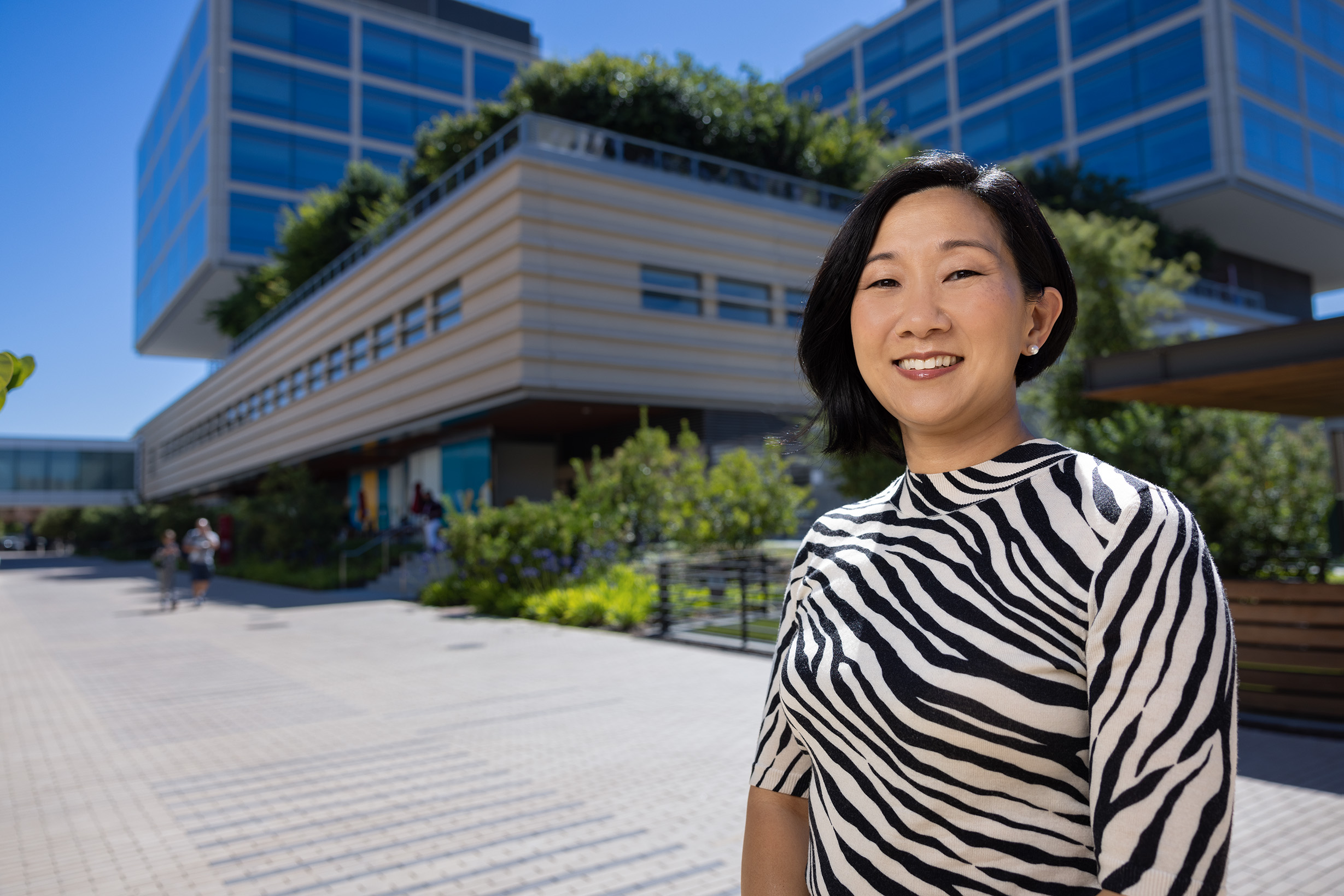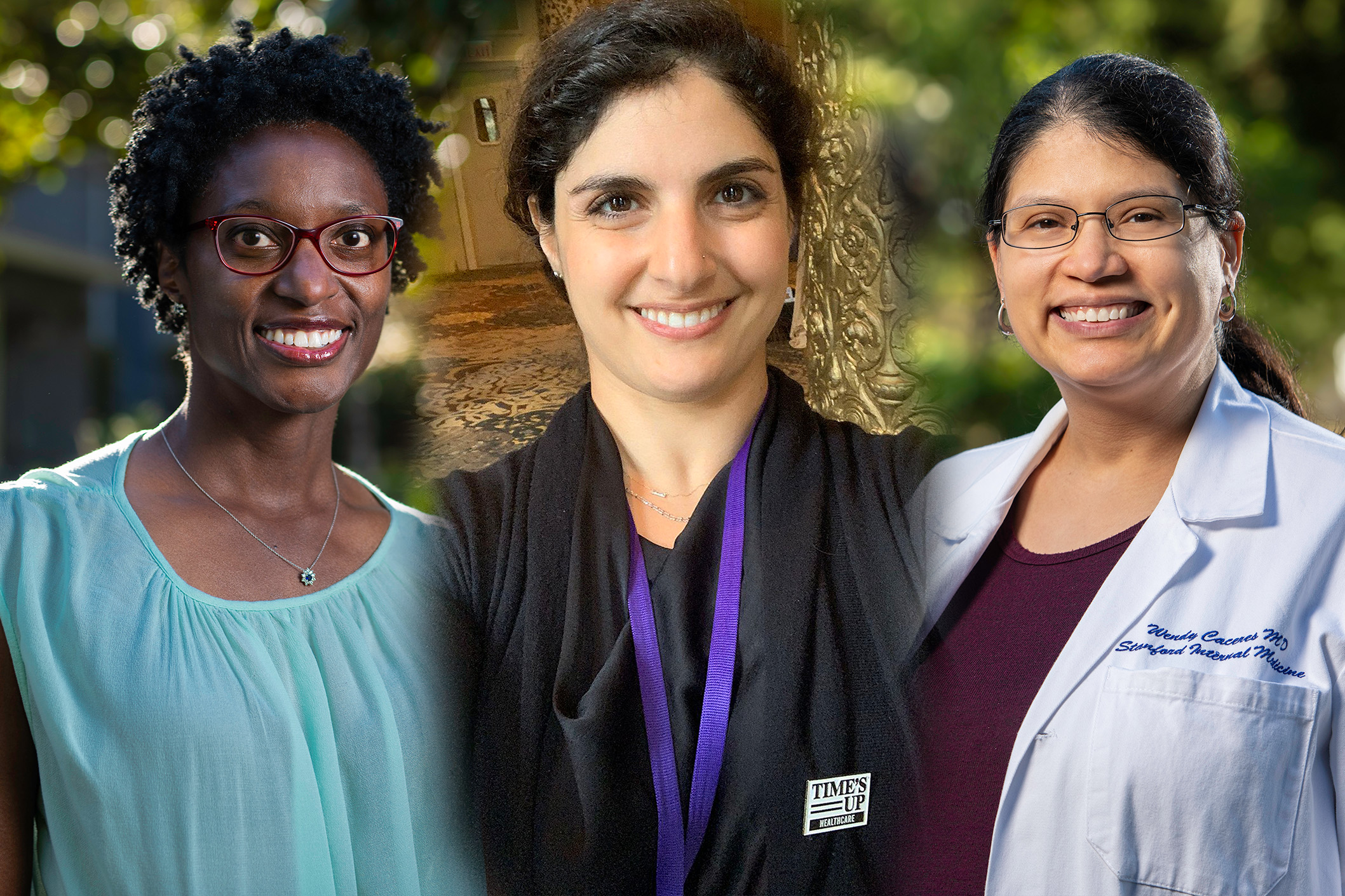Leading with an Open Heart and Mind
Exploring the Harman Approach to Women’s Leadership
Stephanie Harman, MD

Stephanie Harman, MD
Leading with an Open Heart and Mind
Exploring the Harman Approach to Women’s Leadership
When Stephanie Harman, MD, clinical associate professor of primary care and population health, was a literary studies major at a small liberal arts college in Massachusetts, she found herself torn between the humanities and the sciences. Though she ultimately opted to pursue a career in medicine, this early interest in literature and the arts has persisted to the present day, and it now informs her doctoring experience and approach to patient care.
Harman recently told the hosts of the podcast “The Doctor’s Art,” “With literature and the arts, there is something about the different ways to express human experience that I think keeps our hearts and minds, or at least my heart and mind, open to what people go through with illness.” Compassion, empathy, a patient- and human- centered perspective, and a genuine respect for diverse forms of expression are some of the themes reflected in Harman’s words and her work, as clinical associate professor of primary care and precision health (PCPH) and co-founder of Stanford’s palliative care program.
Her long-time mentor Odette Harris, MD, MPH, the Paralyzed Veterans of America Professor of Spinal Cord Injury Medicine, believes these core traits, plus a passion for promoting diversity and inclusivity, make up the foundation of Harman’s particular approach to leadership. “Dr. Harman is a unique combination of compassion, empathy, and strategic leadership,” she says. “She works tirelessly to advocate for and elevate women and underrepresented minorities (URMs). She is guided by the ethos of patient-centered care and her commitment to a diverse and inclusive field.” Harman’s approach to leadership — as applied at the local, school, hospital, and national levels — shows a determination to keep promoting women in and to positions of leadership, to elevate the voices and experiences of marginalized women and underrepresented minorities. The model she sets encourages everyone to practice leadership as learning, as a commitment to convening meaningful conversations, and as a challenge to approach work and others with open minds and compassionate hearts.

Women Leaders in Academic Medicine: Leading with a Learner’s Mindset in Precision Care and Population Health
Harman founded Women Leaders in Academic Medicine (WLAM) in PCPH and serves as director.
Now in its fourth year of operation, WLAM in PCPH represents a concerted effort on behalf of division leadership starting in 2018 to address what primary care and population health division chief Sang-ick Chang, MD, describes as past “concerns that women in the division did not feel they had equal voice and influence in the workplace.” Chang recognized the opportunity this situation implied and turned to Harman for her ideas on how to make a change.
In response, Harman proposed a leadership development program for women in the division inspired by Harris’s Stanford Network for Advancement and Promotion (SNAP) program. Harris — whom Harman admires as a “wonderful leader” with “a vision around how to build community for women leaders and women of color” — has cultivated a model for leadership development based in low-structure, high-impact discussion sessions.
Harman’s previous experience as the founding director of Stanford’s palliative care program — when she realized she didn’t know what she was doing and had to look to others for learning and inspiration — represents a foundational experience that has infused her current philosophies around leadership. It was during that period of immense professional growth that she learned to fully embrace the role of student and realized that observation and apprenticeship were the best ways to learn about program operations and leadership.
Leadership is not a set of immutable traits, but rather skills that come from training, just like communication in palliative care.
– Stephanie Harman, MD
Leadership is not a set of immutable traits, but rather skills that come from training, just like communication in palliative care.
– Stephanie Harman, MD
She now believes, “Leadership is not a set of immutable traits, but rather skills that come from training, just like communication in palliative care.” Co-founder of KSE Leadership Lisa Stefanac, clinical associate professor of business at the University of Chicago, adds, “Steph leads with a learner’s mindset.”
Under Harman’s leadership, PCPH’s WLAM program has attracted three cohorts, with approximately 27 total academic women engaging in what Harman describes as “affinity groups.” Each month, a community member presents a case of a challenge she is facing or working on to the group, and, with the help of a facilitator, the community explores the topic through interactive discussion and proposes possible solutions or considerations. This model is adaptable, able to fit the diverse and multifaceted needs of a division or department and cover a wide range of leadership topics and focus areas.

Tamara Dunn, MD; Arghavan Salles, MD, PhD; Wendy Caceres, MD
community-based leadership. He says, “Under Stephanie’s leadership, WLAM has been a transformative experience for dozens of women faculty in our division. Providing a combination of vision, empowerment, and a sense of shared community, the program has given both heart and skills to women faculty and has played an important part in their retention, engagement, and advancement.”
Creating a More Diverse and Equitable Workplace for Academic Women in Stanford Medicine
In addition to Harman’s efforts to effect change in women’s leadership development opportunities at the local (division and department) levels, she co-chairs the Stanford Health Care ethics committee, where she considers how to deliver care at the hospital and apply policies equitably, and serves in a couple of capacities across Stanford School of Medicine with meaningful impacts on the lives of academic women and URMs.
First, she was recently appointed to a medical school position in the Office of Faculty Development and Diversity (OFDD), as co-faculty director of the Stanford Leadership Development Program with Jay Shah, MD, associate professor of urology. Jointly sponsored by the Office of the Chief Medical Officer at Stanford Health Care, the program reflects Harman’s continuing drive to effect change in the representation of women in academic leadership and to create a more diverse and equitable workplace.
For this program, 30–35 physician participants are selected each year to learn the skills required to lead programs, sections, or teams within an academic medical center. During the selection process, candidates are ranked on their demonstrated commitment to building diversity and potential for growth as a leader. Particular effort is made by the selection committee to ensure diversity within each cohort, with approximately half being women and 25% from URMs. Harman joined forces again with OFDD in August 2021, when she began co-chairing the Taskforce to Mitigate the Impact of COVID-19 on School of Medicine.
Steph’s dedication to promoting women’s leadership lives in her bones and is guided by a fierce and protective inner drive for women’s equity, for what will create a just and equal world at Stanford and beyond.
– Lisa Stefanac
Steph’s dedication to promoting women’s leadership lives in her bones and is guided by a fierce and protective inner drive for women’s equity, for what will create a just and equal world at Stanford and beyond.
– Lisa Stefanac
Women Faculty with Christy Sandborg, MD, professor emeritus of pediatric rheumatology. The Taskforce was charged to draw from university and national data to address the impact of COVID-19 on women faculty at Stanford Medicine and identify actions to implement interventions.
With Harman and Sandborg’s direction, the Taskforce’s 17 Stanford Medicine faculty members generated a report that summarized their findings. Proposed short-, mid-, and long-term interventions included support for flexible work arrangements and paid parental leave, DEI education, pandemic-related support programs, caregiving support services, mental health support, and standardization of processes to identify and promote women leaders, to name a few.
With characteristic empathy and compassion, Harman urges her peers to recognize the terrible tolls that COVID has taken on the lives and careers of academic women throughout the medical school. “This is not a onetime impact. It is ongoing. The pandemic isn’t over yet,” she says. The Taskforce’s vision for the report is that it will serve as a tool kit for departments to mitigate the impacts of the pandemic on all faculty, but especially on women and people with intersectional identities, for whom the pandemic exacerbated and added to preexisting biases and barriers. Harman asserts that COVID-19 has resulted not just in losses of life, but also in heartbreaking “losses of talent and community.”
Towards a National Approach to Inclusive Leadership
In February 2020, Harman turned her sights to the national stage, when she

organized a full-day preconference on women’s leadership for the Cambia Health Foundation’s Sojourns Scholar Leadership Summit. Facilitators from the global leadership development firm Cultivating Leadership led an interactive workshop enabling palliative care providers and experts to connect with a national community of women and explore methods for engaging with power differently and elevating their impact.
This palliative care event neatly presents Harman’s approach to women’s leadership. As Stefanac claims, “Steph’s dedication to promoting women’s leadership lives in her bones and is guided by a fierce and protective inner drive for women’s equity, for what will create a just and equal world at Stanford and beyond. She looks to empower women in their career and leadership choices. She does this by creating community among women, forums where women can connect and lift each other up.”
Executive coach Bonnie Wentworth believes that Harman — through her work “as a dedicated student and leader of gender equity at Stanford” and beyond — embodies writer Margaret J. Wheatley’s vision of a leader as “a host — one who convenes diversity; one who convenes the meaningful conversations.”
